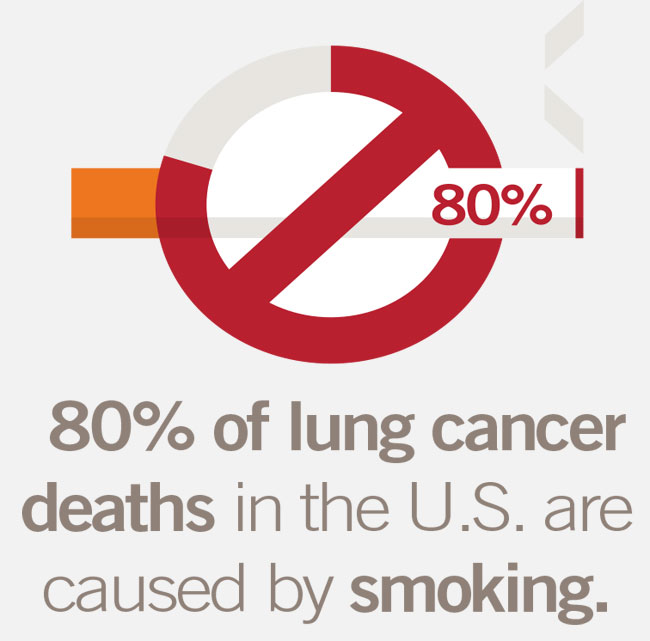
Lung Cancer
Types of Lung Cancer
 Lung cancer may originate in the lungs (primary cancer), or it may start elsewhere in the body and spread to the lungs (secondary cancer). There are two main types of lung cancer:
Lung cancer may originate in the lungs (primary cancer), or it may start elsewhere in the body and spread to the lungs (secondary cancer). There are two main types of lung cancer:
- Small cell lung cancer is a fast-growing cancer. It may be limited in nature, meaning it affects only one lung or its surrounding tissue, or it may be extensive, meaning that it has metastasized (spread)to other parts of the body.
- Non-small cell lung cancer (NSCLC) is more common, making up about 85% of all lung cancers. There are four stages of NSCLC, and they range in severity from Stage I (the cancer is only in the lung and hasn’t spread to the lymph nodes) to Stage IV (the cancer has spread to both lungs and other parts of the body).
- When discovered in its earliest stages, NSCLC is one of the most treatable cancers.
Symptoms
Lung cancer does not usually cause symptoms in its early stages. When symptoms do occur, they may include worsening cough or coughing up blood, chest pain, weight loss, weakness and fatigue, or recurring lung infections.
When it spreads to other parts of the body, lung cancer can cause symptoms that affect that part of the body. For example, if the cancer has spread to the brain, it can cause headaches, dizziness, balance problems, seizures, and other neurological problems; in the bones, it can cause pain.
Lung cancer diagnosis
If you show signs of having lung cancer, you may need to undergo a number of exams and tests. Such tests may include:
- A complete medical history to identify risk factors, symptoms, and physical signs of cancer
- Imaging tests such as a chest x-ray, MRI, or a CT or PET scan to look for signs of lung cancer
- Microscopic tests such as biopsy or lab tests to confirm the diagnosis of lung cancer.
If you are diagnosed with lung cancer, your doctor will need to determine the type and stage of the cancer to plan the best treatment for you. The lung cancer program at Norton Thoracic Institute features not only diagnostic and interventional services, but also includes first-rate supportive care as you and your loved ones actively participate in decisions regarding your treatment.
Treatment
Your doctor will work with other cancer specialists to design the best treatment course for your particular cancer. Patients with small cell lung cancer usually undergo radiation therapy and chemotherapy. People with NSCLC are often treated with surgery, chemotherapy, radiation therapy, or a combination of these treatments.
- Surgery is the most effective treatment for early-stage NSCLC. During surgery, the physician removes cancerous tissue and other affected structures. The amount the surgeon removes depends on how much the cancer has spread. There are two main types of surgery:
- Thoracotomy: The surgeon makes a large incision in the chest and ribs and spreads the ribs open to access the lungs.
- Minimally invasive surgery: The physician makes three small incisions in the chest andmaneuvers miniaturized surgical instruments through these incisions to access and remove the tumor. Although this involves more incisions, they are smaller and result in less postoperative pain, fewer days in the hospital, and a quicker recovery than in a thoracotomy procedure.
One type of minimally invasive surgery available at Norton Thoracic Institute is video-assisted thoracoscopic surgery, or VATS. VATS is appropriate for patients with Stage I, II or early Stage III NSCLC. In a VATS procedure, the surgeon uses a small video camera to magnify the cancer tissue. Using the video feed for guidance, the surgeon is able to remove the tumor and cancer cells.
- Chemotherapy, the use of oral or IV drugs to kill cancer.
- Radiation therapy, the use of high-energy rays to destroy cancer cells.
Prevention
If you are at risk of lung cancer, you should talk to your doctor about getting a lung cancer screening. Your chance of surviving lung cancer is highest when the disease is discovered in its earliest stages, before it has spread.
- Don’t smoke. If you are a smoker, take steps to quit; if you don’t smoke, don’t start. Smoking tobacco is the number-one cause of lung cancer.
- Avoid second-hand smoke at home, in public, and at work.
- Maintain a healthy diet with lots of fruits and vegetables.
Learn More About Our Lung Cancer Program
For more information or to find a lung cancer specialist, please call (602) 406-4000.

